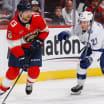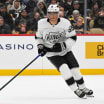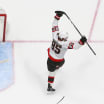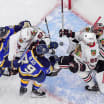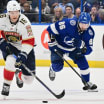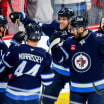NHL.com's Q&A feature called "Sitting Down with…" runs each Sunday. We talk to key figures in the game, gaining insight into their lives on and off the ice.
This edition features Hockey Hall of Fame defenseman Chris Pronger.
Pronger talks Blues, family travel business in Q&A with NHL.com
Hall of Fame defenseman will have number retired by St. Louis
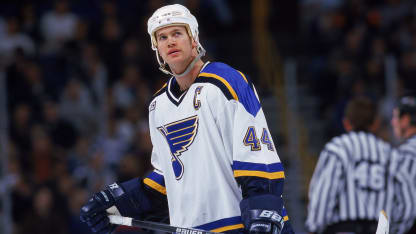
© Elsa
Chris Pronger will have his No. 44 retired by the St. Louis Blues on Monday before their game against the Nashville Predators at Enterprise Center (8 p.m. ET; BSMW, BSSO, ESPN+, NHL LIVE).
The defenseman played 598 games during nine seasons with the Blues from 1995-2004, scoring 356 points (84 goals, 272 assists). He won the Hart Trophy as the NHL's most valuable player and the Norris Trophy as the best defenseman in 1999-2000, when the Blues also won the Presidents' Trophy for having the best record in the NHL.
Pronger finished in the top five in Norris Trophy voting five times with the Blues.
He finished his NHL career with 698 points (157 goals, 541 assists) in 1,167 games with the Hartford Whalers, Blues, Edmonton Oilers, Anaheim Ducks and Philadelphia Flyers from 1993-2012. Pronger won the Stanley Cup with the Ducks in 2007.
Pronger moved back to the St. Louis area after the 2011-12 season, his last in the NHL. He spent three seasons working in the NHL Department of Player Safety and was an executive in hockey operations with the Florida Panthers from 2016-20.
Pronger, 47, stepped down from his role with the Panthers on July 8, 2020, to focus on his family's business, Well Inspired Travels, a luxury travel company founded by Pronger and his wife, Lauren.
NHL.com caught up with Pronger and talked about having his number retired by the Blues, his business and some memories of his time with St. Louis.
What does having your number retired mean to you and how does it impact you to have this happen and join the rafters with the likes of Al MacInnis (2), Bob Gassoff (3), Bob Plager (5), Barclay Plager (8), Brian Sutter (11), Brett Hull (16) and Bernie Federko (24)?
"It's an honor. I think it speaks to my tenure here in St. Louis and I guess what I meant to the organization, the fans, the city. It's humbling to be up there in the history of the franchise and have your number recognized and your name, etc. It will be in the history books of the St. Louis Blues forever, so it's pretty special. You've got 2, 3, 5, 8, 11, 16, 24 and now 44. It's neat that I get to bookend it with Al (MacInnis)."
You played in other markets (Hartford, Edmonton, Anaheim, Philadelphia), but do you identify yourself with the Blues because you played in St. Louis the longest?
"Yeah. I think when you look at my tenure here if you will, I got here as a 20-year-old quasi-kid and left a 30-year-old man with a wife and two kids and a lot of knowledge about the game and life. I think I grew up a lot and matured and learned more about the game itself, the game within the game, from the media to how to be a pro to how to prepare, all the finer details and the finer points of being an NHL player and being an elite player. I had a lot of great players that helped guide and steer me, Al being one of them. Having the ability to play with Grant Fuhr, 'Hullie' (Brett Hull), Geoff Courtnall, (Wayne) Gretzky for a little bit, and learning from those guys made a big difference. Seeing how Gretzky managed his day to day, how he practiced, how he prepared, all the little things that you can pick up through osmosis really if you're paying attention. It doesn't happen overnight, but when things start to click, that's when you start to see the biggest changes."
You had a lot of good years, but none better than 1999-2000 with the Blues. That was the year you won the Hart Trophy and the Norris Trophy. Why?
"I had a great offseason of training. I was not injured the previous year going into the summer so I was able to begin training instead of rehabbing. I had just clarity of how I wanted to play. I was maturing in life, maturing within the game, understanding how I needed to play, how I needed to prepare. All of those little things were starting to add up. Year over year of training, working on little idiosyncrasies within the game. Working on my weaknesses, working on my strengths and working to continue to make sure those were my strengths. And also you look at that year I played with our checking line for predominantly most of the year 5-on-5. That line included Scott Pellerin and Craig Conroy, and they had a great year. That line was very similar to the Rob Niedermayer, Sami Pahlsson and Travis Moen line when I was in Anaheim, where we spent a lot of time in the other team's end and frustrated the top line of other teams by playing offense and making sure that we weren't forcing the game, we were allowing the game to come to us and then reading, reacting and playing at a high level. We just matched up and we were very in tune because we played together so much."
Do you think without the lockout in 2004-05 and no NHL salary cap put in place that you would have continued with the Blues and finished your career in St. Louis?
"I don't know. I learned a long time ago to never look back. Everything happens for a reason. I guess how people looked at me and looked at my career and looked at how I played the game and how I led there were a lot of questions about me or asked of me when I was here in St. Louis. Some were real. Some were made up. Some, who knows where they came from. But I think when you look at going to Edmonton, Anaheim, Philadelphia, the narrative changes pretty quickly. … Really, it's maturing and it's understanding how you have to play the game and prepare. You have to evolve with the game. Coming out of the lockout, apparently I was going to be a dinosaur and the game was going to pass me by with all the new rules. I would argue I was better under the new rules than I was under the old rules. The point is, you never know how things are going to play out."
So what are you doing now?
"My wife started a boutique luxury travel company and I was helping her on the side when I was working with Florida. I was helping her with the business plan and helping her with some connections and networking. I started to really enjoy myself when things were really not going great in Florida. Growing up I had a couple passions. One obviously was to play in the NHL and the second was to either own and operate my own business or be a president or GM of an NHL team. I was able to accomplish the one goal. I started down the one path but I think you know when it's not a good fit. You're told what to do, where to go, how to do it for 30-plus years, eventually you get tired of that and you want to live your own life and do your own thing.
"I never really identified myself as a hockey player. I am Chris Pronger, and yes, something that I did was play hockey. You try to get away from those stereotypes and those types of analogies of somebody. I really just started to enjoy what we were building and felt like there was a way to really help our clientele through the travel experience and the things that we are able to provide to them. A lot of what we do is predicated on our experiences in our life and how we've used travel to help me get healthy, work on our marriage, get together and reconnect with our kids."
Do you find that everything you've done in your playing career, domestically and internationally, pays dividends when you're talking to clients now?
"Absolutely and obviously playing with players from different cultures and backgrounds. When you're a kid in the era that I grew up, you're not really that open to learning more because the game was predominantly North American. As I progressed through my era it really became a lot of European and American. You look at how many Canadian players are in the League now versus when I came on the scene in 1993 it's drastically reduced and in a good way. It means the game is growing. It means players from all walks of life are coming into the NHL. That's great for the game. It grows the game. It gets more people involved and interested in the game."
Have you closed that door to work in the NHL again? Is this the new passion now?
"You know what, I learned a long time ago never say never because you just never know what opportunity will be presented, etc. But I have no visions of coming back to the League and doing anything within the hockey world. I bandied around possibly doing some commentating and stuff like that, but from a time perspective, it just didn't matchup. I think for me I'm just enjoying what I'm doing and happy with what I'm doing in helping people with their travel and getting to know people on a much more personal level. That to me is the most interesting part, learning about how other people view life and how they deal with the day-to-day world we live in, the different pressures and demands on their time.
"When I was playing, I'd watch other players and watch other games and pick out little things you could add to your repertoire, into your game. Life is no different. You watch how people handle the pandemic, how they handle stress, how they deal with raising kids, all the things we deal with on a day-to-day basis and you're able to learn by paying attention, talking to people and listening to what they have to say."
What was the strangest, weirdest or craziest thing that you can think of that happened to you during your NHL playing career?
"Well, having a slap shot go off my heart and it skipping a beat and me going down was not the easiest of things. I don't know if weird would be the word, but there was just crazy stuff like that. You talk about timing, talk about things happening for a reason. There's all kinds of things when you look back and you can say, 'What if I didn't do this?' or 'What if that didn't happen?' One year my knee was bothering me; it didn't bother me to play, didn't bother me to walk, the only time it bothered me was to get in and out of my car and in and out of bed, that's it. So I went in and got an MRI and there was torn meniscus. I'm like, 'Let's just deal with it at the end of the year.' We were having a good year. It was 2000-01. It was right before the All-Star break. [Blues general manager] Larry [Pleau] said, 'Let's just get it fixed.' I said, 'If I get it fixed I need it to be good, I'm not going to rush back.'
"Of course, I get it fixed and we come back from the All-Star break and the team isn't playing good so all of a sudden it's, 'Hey, you need to come back.' I'm not ready, but I rush back and, typical, the first game I get a slap shot from my own teammate go off of my arm and it shatters my arm. The guy was clearing the puck, I came out of the penalty box screaming for the puck. I wanted it as a pass on my stick. He took a slap shot to ice the puck. I put my arm up to protect myself and it got into a hole and it shattered my arm. I then get a plate put on my arm, try to come back, we lose in the conference final to Colorado and I can barely move my hand. That creates the next year my arm is useless again. I then blow my ACL out the following playoffs against Detroit. I go in and get reconstructive surgery on my wrist twice and ACL surgery on my knee. When you look back on it, it's all because I got knee surgery. When you look back and go back and you really want to dig deep that was the precursor to everything, getting knee surgery when I didn't even want it. Hey, c'est la vie; that's life."
